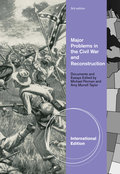
Major problems in the civil war and reconstruction
Perman, Michael
Taylor, Amy Murrell
Designed to be either the primary anthology or textbook for the course, this best-selling title covers the Civil War's entire chronological span with a series of documents and essays. INDICE: Note: Each chapter concludes with Further Reading. 1. PERSPECTIVESON THE SECTIONAL CONFLICT. Essays. James M. McPherson, "The Second American Revolution," Hayes Historical Journal, Spring 1992. Drew Gilpin Faust, "We Should Grow Too Fond of It: Why We Love the Civil War," Civil War History, December 2004, pp.368-83. LeeAnn Whites, "The Civil War as a Crisis in Gender," in Catherine Clinton and Nina Silber, eds., Divided Houses: Gender and the Civil War (Oxford University Press,1992), pp.3-21. Edward L. Ayers, "The First Occupation," The New York Times Magazine, May 29, 2005 (entire article). 2. THE SLAVESOUTH. Documents. 1. Frederick Law Olmsted Observes Southern Lassitude, 1854.2. Hinton Rowan Helper Exposes Southern Backwardness, 1857. 3. James Henry Hammond Claims Southern Cultural Superiority, 1845. 4. George Fitzhugh Praises Southern Society, 1854. 5. J.D.B. DeBow Explains Why Nonslaveholders Should Support Slavery, 1860. 6. An Abolitionist Journal Condemns Slavery and the Slave Trade, September 1837. 7. N.L. Rice, a Proslavery Minister, Blames Abolitionists for the Slave Trade, October 1845. Essays. James M. McPherson, "Antebellum Southern Exceptionalism: A New Look at an Old Question," Civil War History, September 1983, pp.230-44. Steven Deyle, The Domestic Slave Trade as Slavery's Lifeblood. 3. THE IMPENDING CRISIS. Documents. 1. The Independent Democrats Protest the Kansas-Nebraska Act, January 1854. 2. Stephen Douglas of Illinois Explains the Objectives of His Bill, February 1854. 3. Senator Robert Toombs of Georgia Insists on Congress's Responsibility to Protect Slavery in the Territories, January 1856. 4. Senator William Henry Seward of New York Warns of an Irrepressible Conflict, October 1858. 5. Senator Albert G. Brown of Mississippi Denounces the Federal Government for Failing to Protect the South, December 1859. Essays. William E. Gienapp, "The Republican Party and the Slave Power," in Robert H. Abzug and Stephen E. Maizlish, eds., New Perspectives on Race and Slavery in America. (Lexington: University Press of Kentucky, 1986) pp. 51-75. Don E. Fehrenbacher, "Kansas, Republicanism, and the Crisis of the Union," in Fehrenbacher, The South and Three Sectional Crises (Louisiana State University Press, 1980), pp. 45-65. 4. SECTIONALISM AND SECESSION. Documents. 1. Ralph Waldo Emerson Condemns the South for the Assault on Charles Sumner, February 1857. 2. Abraham Lincoln Addresses the Issue of Sectionalism, February 1860. 3. South Carolina Declares and Justifies Its Secession, December 1860. 4. Mississippi's Secession Commissioner Urges Georgia to Secede, December 1860. 5. Confederate Vice-President Alexander H. Stephens Identifies "The Cornerstone of the Confederacy," March 1861. Essays. Susan-Mary Grant, "When Is a Nation Not a Nation?: The Crisis of American Nationality," in Grant, North Over South: Northern Nationalism and American Identity in the Antebellum Era (University Press of Kansas, 2000), pp.130-52. Manisha Sinha, "Revolution or Counterrevolution?: The Political Ideology of Secession in Antebellum South Carolina," Civil War History, September 2000, pp.205-26. 5. GENERALS AND CAMPAIGNS: HOW THEY FOUGHT.Documents. 1. George B. McClelland Gives President Lincoln a Lesson in Grand Strategy, July 1862. 2. General Robert E. Lee Takes the Offensive, September 1862. 3. General E. Porter Alexander, C.S.A., Assesses Lea and McClellan at Antietam, September 1862. 4. General Grant Transmits His Plan for the Overland Campaign, April 1864. 5. Grant Recalls His Thoughts on the Eve of the Overland Campaign, 1886. 6. General William T. Sherman Explains How the War Has Changed,September 1864. 7. General Grant Reports His Assignment Accomplished, July 1865. Essays. Gary W. Gallagher, "A Civil War Watershed: The 1862 Richmond Campaign in Perspective," in Gary Gallagher, ed., The Richmond Campaign of 1862: The Peninsula and the Seven Days (Chapel Hill: The University of North Carolina Press, 2000) pp. 2-23. Mark Grimsley, "The Significance of the Overland Campaign, April-May 1864," in Grimsley, And Keep Moving On: The Virginia Campaign, May-June 1864 (University of Nebraska Press, 2002), xiii-xvii, 222-39 + map on p.5. 6. SOLDIERS AND COMBAT: WHY THEY FOUGHT. Documents. 1. John H. Cochran, C.S.A., Argues that Secession Will Protect Slave-holders, March 1861. 2. Charles Harvey Brewster, U.S.A., Rejects Accommodation with Slave-holders, March 1862. 3. Charles Willis, U.S.A., Comments on Runaway Slaves, April 1862. 4. Eugene Blackford, C.S.A., Describes His First Experience of Combat, July 1861. 5. Wilbur Fisk, U.S.A., Discusses Morale among the Soldiers, April 1863. 6. Tally Simpson, C.S.A., Reports on the Aftermath of Gettysburg, July 1863. Essays. Aaron Sheehan-Dean, "Everyman's War: Confederate Enlistment in Civil War Virginia," Civil War History, March 2004, pp.5-26. Chandra Miller, "A 'Vexed Question': White Union Soldiers on Slavery and Race," in Aaron Sheehan-Dean, ed., The View from the Ground: Experiences of Civil War Soldiers (University Press of Kentucky, 2007), pp.31-66. Reid Mitchell, "From Volunteer to Soldier: The Psychology of Service," in Mitchell, Civil War Soldiers (Viking Penguin, 1988), pp.64-82. 7. THE NORTHERN HOME FRONT. Documents. 1. The Detroit Soldiers' Aid Society President Calls on Women to Assist the War Effort, November 1861. 2. MaryLivermore Recounts How She Organized the 1864 Northwestern Sanitary Fair, 1889. 3. Cincinnati Sewing Women Protest Their Wartime Wages, February 1865. 4. Henry W. Bellows Explains the Work and Goals of the Sanitary Commission, January 1864. 5. President Lincoln Addresses the Philadelphia Central Fair, June 1864. 6. Secretary of the Treasury Chase Appeals to the Public for Financial Support, July 1861. 7. The New York Tribune Supports Expansion of the Government Bond Drive, March 1865. Essays. Nina Silber, "The Problem of Women's Patriotism, North and South," in Nina Silber, Gender and the Sectional Conflict (Ch
- ISBN: 978-0-495-90895-1
- Editorial: Wadsworth
- Encuadernacion: Rústica
- Páginas: 528
- Fecha Publicación: 01/07/2010
- Nº Volúmenes: 1
- Idioma: Inglés
